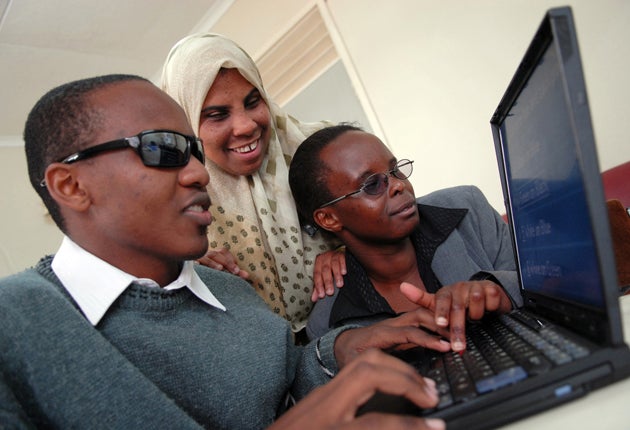Independent Appeal: Bridging the digital divide for the blind of Kenya
Daniel Howden reports from Nairobi on the pupils swapping Braille slates for talking computers

Africa abounds with stories of incredible distances travelled by pupils to get to school. Few can have gone as far as Joshua Mbayo. An albino with poor vision, he had to journey more than 250 miles to find a place that would agree to teach him. Naturally, when he got there he stayed.
Today, the unwanted pupil is a sought-after teacher at a school in Kakamega in western Kenya. Understandably, he has a special interest in blind or visually impaired children of whom there are about 10 among the school's 600 pupils. "I want to be a good role model," he says with determination. "To end the stigma we should encourage learning where they go to normal schools and mix with other children."
That's not always been easy in a country struggling to meet its commitment to free primary education and failing even to teach many children without special needs. But technology can help to bridge that gap. Which is why the English and French teacher has been at the Kenya Union of the Blind (KUB) in Nairobi since the end of term, being trained to use its computers and teaching software.
After a few days at the keyboard he already speaks with a geekish enthusiasm. The boy who was taught with Braille slates looks thrilled to be surrounded by screens crowded with large letters, talking books and voice-command software. "The current world is very fast. We should reach the remote villages and connect them so they are less cut off from the rest of the world," he says.
This chimes almost exactly with the aims of Gladys Muhunyo, head of the Kenyan branch of Computer Aid International – one of the three charities in this year's Independent Christmas Appeal – which supplies the machines and the software at the KUB. "The blind and visually impaired in Africa have been ignored for a long time," she says. "Bridging the digital divide is about providing a total solution." In this case, the solution is not only refurbished, second-hand computers donated by rich countries but the scanners, printers and the software to make it all work. "Without the right software, the computers are just boxes," she says.
Open-source software – free-to-use programs donated by developers which can then be customised to particular needs – has proved to be a boon. Computer Aid has employed its own research and development officer, Ugo Vallauri, to collect feedback from African users.
Putting a Braille machine in front of a child costs an initial $600 (£375). A digital book stored on a USB stick with open-source software to read aloud to the child costs about $3. "This has been a big step for us," says Martin Kieti, the head of KUB. "We're looking at a 95 per cent reduction in costs."
KUB, with the assistance of Computer Aid, is running six primary schools for blind and visually impaired children, three secondary schools, and three teacher-training colleges, as well as a partnership with three universities. They found that a pilot group of visually impaired university students given laptops and software to take notes with began to uniformly score As. The pilot scheme will be rolled out as soon as there is funding.
There is still a long way to go. A recent study by Kenya's ministry of education found that out of 15,000 children suffering serious problems with their eyesight, only 3,000 were in school. "Very few schools are integrating children, so we're not there yet. And if the child is sitting there doing nothing because they can't join in then they won't come back the next day," says Mr Kieti.
Special schools are few and far between and even with subsidies can cost up to £100 per year – a small fortune for many parents in Kenya. The KUB director, like so many children with visual problems, couldn't go to school near home. He faced the stigma of being sent away and even when he was routinely top of the class found that his parents weren't interested as it was "the top of a special school class". It was only when he became the first member of his family to go to university that they realised how bright their son was.
Even those who go to school and get an education still face huge obstacles in the workplace. As a degree-holder working as an assessment officer with the education ministry, Asiko Evalyne might expect some understanding over her poor eyesight. Instead, she is bullied by some senior staff who resent her attending training workshops and criticise her for taking breaks which she needs to avoid blackouts. Getting a job was hard enough, she says, as "everyone thinks you will be a burden".
But between sessions with the KUB tutor, she is enthused: "Training has helped me a lot. Previously I just saw a computer but didn't know how to use it as I can't focus on the screen." That's changing fast, she says: "I feel great, I'm very proud and I know I can communicate. I can do my job and be ahead of the others. And with a little practice, I will be."
Click here to donate to the Independent Christmas Appeal
Subscribe to Independent Premium to bookmark this article
Want to bookmark your favourite articles and stories to read or reference later? Start your Independent Premium subscription today.

Join our commenting forum
Join thought-provoking conversations, follow other Independent readers and see their replies